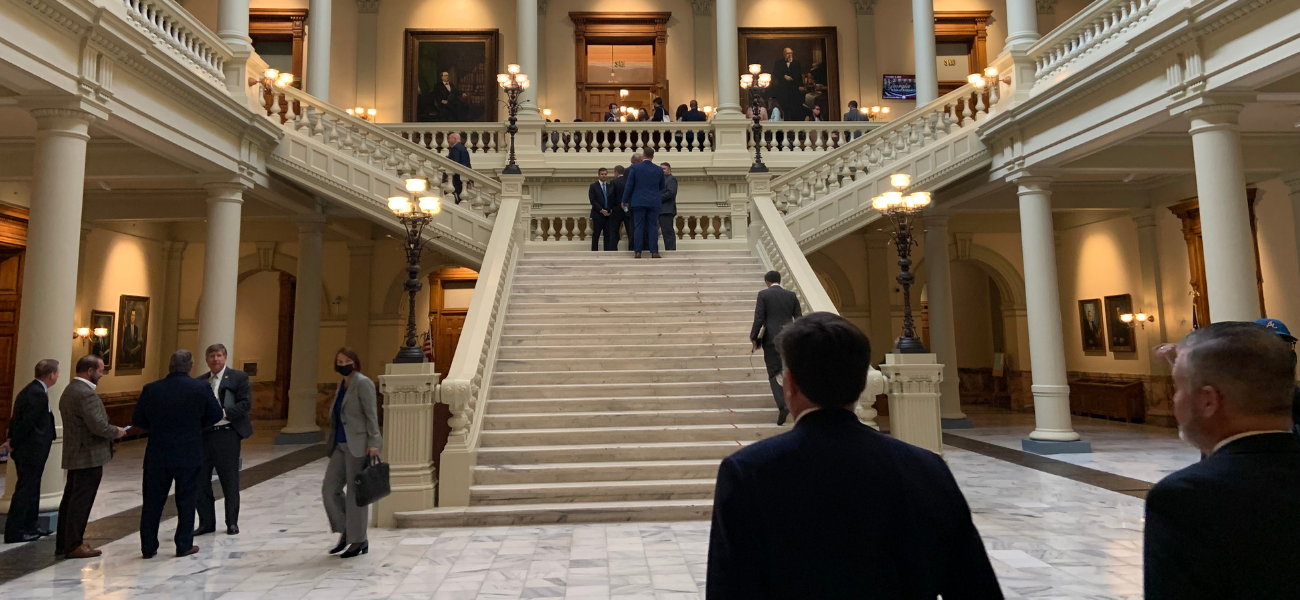Stay ahead of the curve as a political insider with deep policy analysis, daily briefings and policy-shaping tools.
Request a DemoGeorgia’s Governor has Nearly $5 Billion in Pandemic Relief to Spend. How Will He Use It?

Photo Credit: Alessandro Marazzi Sassoon
- Georgia is set to receive $17.4 billion in American Rescue Plan funds through 2024.
- $4.8 billion of that goes towards the State Fiscal Recovery Fund that Gov. Brian Kemp has direct discretion over.
- Georgia is unlike most states because the power over that fund is entirely the governor’s.
It’s been eight months since the American Rescue Plan (ARP) granted Georgia billions of dollars to spend. Where $4.8 billion worth of the money will go is up to one man: Gov. Brian Kemp.
In most states, the legislature controls the distribution of federal funds. Georgia is just one of five states where the governor is left with sole discretion over how to spend the $4.8 billion State Fiscal Recovery Fund, which makes up nearly a quarter of the state’s total ARP allocation of $17.4 billion, according to the Governor’s Office of Planning and Budget. But Kemp has yet to tell the public what he intends to do with most of that money.
“That’s money the governor’s office has direct authority over, they have an enormous amount of latitude, but they really have not given much clarity as to how those funds will be used,” said Danny Kanso, a senior policy analyst at the Georgia Budget and Policy Institute (GBPI).
To be clear, the ARP is a massive $1.9 trillion relief bill that passed in March. Georgia will receive $17.4 billion to spend by 2024. Much of that ARP money will be used to support local governments, schools, hospitals, and federal institutions in ways that are predetermined by the law. The State Fiscal Recovery Fund is money reserved from each state’s allocation for state governments to spend on pandemic relief at their own discretion.
That’s the $4.8 billion portion Kemp has direct control over, and so far only $210 million has been allocated.
That just leaves $4.6 billion left to use, or to put that in perspective for Braves fans: enough money to give everyone at a sold-out game at the Atlanta Braves’ stadium $110,000, and still have $100 million leftover.
The fund is meant to be spent on public health, economic relief for households, businesses, and the public sector, bonuses for essential workers, and investment in water, sewer, and broadband infrastructure, according to the guidelines set by the law and the U.S. Treasury Department.
Some policy experts feel that by now, the public should know more specifics about where that money is going to go and point out that other states have already set detailed spending plans for their state fiscal recovery fund allocations. For example, Virginia allocated most of its $4.3 billion through the legislature in August.
“The Office of the Governor is currently in budget development, and, as available, we will continue to provide additional information on the allocation of ARP funds,” Kemp press secretary Katie Byrd wrote in response to questions from State Affairs.

Gov. Brian Kemp has $4.8 billion in federal COVID-19 relief funds to distribute. (Credit: Brittney Phan for State Affairs)
Kemp’s plan for the State Fiscal Recovery Fund
So far, Kemp set aside $100 million for first responders’ one-time bonuses and $110 million to address the judicial backlog from COVID-19.
Additionally, Kemp set up three committees in June to review grant proposals from the public on water and sewer infrastructure, broadband infrastructure, and relief for businesses negatively impacted by the pandemic. How much money will be spent that way is still unknown and the state has delayed the original timetable for the grant process by several months. According to the governor’s office, award decisions are now expected by January 2022.
In response to questions from State Affairs, Kemp’s office said those three committees will award “a portion that has yet to be determined” of the money at their disposal.
There have also been calls for the allocation of funding to be put through the legislature, the way Georgia’s annual budget is decided. The three committees Kemp created include a mix of state appointees such as agency heads and some members of the General Assembly.
“The Georgia General Assembly is well represented on the committees and involved in current discussions on allocation of ARP funds,” Kemp’s office told State Affairs in response to those concerns.
Chris Denson, Director of Policy and Research at the Georgia Public Policy Foundation (GPPF), said Kemp’s appointment of the committees to include members of the legislature was “noble, in that there is a level of direct democratic engagement… just given that inherently within the legislation the governor has full discretion to spend those funds as he sees fit.”
“More than likely, the governor has some spending priorities of his own, but with $4.8 billion, it allows for both the governor’s priorities and some of these grants that the general public has requested,” said Denson of the GPPF. Denson said he would be surprised if most of the money ended up awarded through the three committees’ grant process.

Gov. Brian Kemp speaks to the press at the start of a special session of the Georgia legislature on Nov. 3, 2021. (Credit: Alessandro Marazzi Sassoon for State Affairs).
Urgency and caution: how soon should money be spent?
For Kanso, the urgency caused by the pandemic means it makes sense for the governor to have wide authority over the fund, though he’d like to see the legislature take a more significant role. “By no means is the full General Assembly represented,” he said.
Kanso also thinks the governor should act swiftly to provide relief to those Georgians affected the most. “There’s a responsibility to act for those families who are suffering when we have the resources in hand to do so,” he said.
“I think it’s fair to say that the state has been very slow to unveil its plans to use those ARP funds,” said Kanso.
Denson, of the GPPF, advocates for a more restrained approach to spending the money. Kemp should limit spending those funds first to cover any debts incurred throughout the pandemic, and then put funds towards projects that are “one-time only and do not commit or do not develop a program that comes at a recurring cost to the state,” he said.
“We don’t believe there’s a rush to spend this money unnecessarily, especially given the surplus that the state is running,” Denson said, adding that “prudence is probably the best course of action at this time.”
Meanwhile, the GBPI’s polling of Georgians’ views showed that the public generally wants to see those funds used to assist public K-12 education funding, direct payments for low-income families, and restore state budget cuts that took effect last year.
Now, with the passage of Biden’s infrastructure bill through Congress, and more money heading Georgia’s way, more questions arise about how those will factor into how ARP money is spent. Kanso and Denson both indicated that because the infrastructure bill includes funding for water, sewer, and broadband infrastructure, it is reasonable for Kemp and the committees tasked with awarding grants in those areas to proceed more slowly and cautiously.
Still, Kanso sees the need for Kemp to act more immediately when it comes to relieving Georgians who might be hurting now because of the pandemic.
“We are seeing plans develop as other states step up to the plate here, and you know the pandemic is not going to wait for this process to unfold,” Kanso said, adding “There’s a responsibility to start to put details here, and to act with the urgency that reflects the challenges that we’re dealing with.”
What do you think Gov. Kemp should do with the America Rescue Plan funds at his disposal? Share your thoughts and questions: [email protected].
Professionals still face licensing delays amid state’s transition to online system
The Gist Georgia’s professionals and business owners are still struggling to obtain professional licenses in a timely manner. As the Secretary of State’s Office rolls out its new Georgia Online Application Licensing System to expedite the process, the efficiency of this new process is being put to the test. What’s Happening Thursday morning at the …
Controversy over AP African American Studies class grows
Rashad Brown has been teaching Advanced Placement African American Studies at Atlanta’s Maynard Jackson High School for three years. He’ll continue to do so — even though the state’s top education official removed it from the list of state-funded course offerings for the upcoming school year. While Brown prepares to start teaching his class on …
Students, teachers, lawmakers blast decision to end AP African American history classes
ATLANTA — A coalition of lawmakers, civil rights leaders, clergy, educators and students Wednesday called on the state’s education czar to rescind his decision to drop an advanced placement African American studies class from the state’s curriculum for the upcoming school year. “This decision is the latest attack in a long-running GOP assault on Georgia’s …
Kamala Harris’ presidential bid reinvigorates Georgia Democrats
Georgia Democrats have gained new momentum heading into the November election, propelled by President Joe Biden’s decision to bow out of his reelection bid and hand the reins to Vice President Kamala Harris. The historic decision, announced Sunday, is expected to prove pivotal in the national and state political arenas and breathe new life and …




